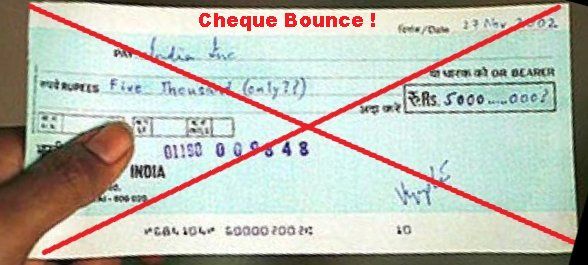Dear Amrut,
The NIA is applied in all cases of check bouncing whether friendly or unfriendly.
The moment the cheque bounces, the person becomes liable.
Martha Butala (Housewife) 12 August 2010
Dear Amrut,
The NIA is applied in all cases of check bouncing whether friendly or unfriendly.
The moment the cheque bounces, the person becomes liable.
ANMOL VERMA (ADVOCATE) 13 August 2010
YES SUERLY ITS APPLIED
nayan joshi (Lawyer ) 15 August 2010
Mr. SKJ..
U r right.. u have appeared in NI-138 matters regularly. sometimes complainant cannot prove his legal debt. sometimes complainant cnn't proove time bar(Limit), so not every time u get success in matter of cheque bounce.. it all depends on record and depends on judge..hw he can understand and hw he can digest..
Thirugnanam (business) 17 August 2010
ur complaint under u/s138 of NI act for cheque bounce is well maintainable.you can proceed
Sunil (Manager) 27 April 2012
If the person giving a friendly loan never gets any documentation in writing from the borrower, also does not present any documentation/proof when the 138 case is filed, further if the borrower does not admit the loan as ever having been given - it is complainant's word aginst the borrower's word - how will the court proceed to come to a conclusion? If I come across a blank signed cheque tomorrow, by deceit, I can claim any amount of loan being given by me to the signer of the cheque - it could be in crores - but will the court believe me or give any credence to my submission if I have no proof.
SAINATH DEVALLA (LEGAL CONSULTANT) 27 April 2012
Dear Sunil,
Choose another thread for your query
DEFENSE ADVOCATE.-firmaction@g (POWER OF DEFENSE IS IMMENSE ) 27 April 2012
Yes since it is a very old thread so pl put a fresh thread.
Nitish Banka (lawyer) 24 December 2017
Sometimes in usual course of business blank cheques are handed over to trusted persons and the cheques are often misused by these persons under the guise a friendly loan is given to the accused.
Now this amount as shown by the complainant is in cash and since its a friendly loan no paper work is done.
But since burden to prove that the cheque was not issued as a legally enforceable debt is on the accused in cheque bouncing case then how he will discharge this burden is the main ground.
Cross examination is an opportunity granted to the accused in such cases as well as his statement under 313 CrPC

In cross examination following questions must be put up-:
As held in Sanjay Mishra vs Ms.Kanishka Kapoor The learned Judge held that the applicant has failed to establish that the cheque was issued by the 1st respondent in discharge of legal liability of the loan amount. The learned Judge observed that the 1st respondent has denied her signatures on the bill of exchange as well as the cheque subject matter of the complaint. The learned Judge has taken into account various circumstances borne out by the evidence on record and has passed order of acquittal. The learned Judge also considered the admission of the applicant that the amount advanced was an unaccounted amount which was not disclosed to the Income Tax Authority.
Therefor recovery of black money is impermissible in law.
Advocate Nitish Banka
nitish@lexspeak.in
